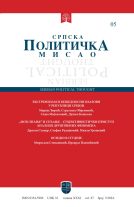- Home page
- Researchers
- Dr. Ivana Luknar
Dr. Ivana Luknar

- Address: /
- Email: ivana.luknar@lux-dog.com
- Telephone: /
- LinkedIn: /
PhD Ivana Luknar - Sociologist, Research Associates and member of Center for Political Sociology, Social Pathology and Public Administration in Institute for Political Studies in Belgrade, Serbia. She graduated from the Faculty of Philosophy of the University of Belgrade with an outstanding degree in sociology. She earned her doctorate in political science at the Faculty of Political Sciences, University of Belgrade with the defense topic "Fight against cyberterrorism in strategic documents of the Republic of Serbia".
During her studies, she worked as a teaching assistant at the Faculty of Philosophy in Belgrade on the subject "Introduction to Sociology". She gained research experience on the projects of the Institute for Sociological Research of the Faculty of Philosophy in Belgrade. In 2019, he was awarded a scholarship by Shanghai Open University in China. As part of the CEEPUS Erasmus program 2020 at the Faculty of Social Sciences, University of Ljubljana, she worked as a research fellow on international relations between China and the West.
He is a participant in numerous projects, among which are: "Small Graduation - Big Heart" (2009), EU-CoE Project "Regional Support for Inclusive Education" under the organization of the Ministry of Education of Italy and the Council of Europe on the mentioned topic (2014) and many others. At the Office for Human and Minority Rights, she worked on the implementation of inclusive policies and EU standards in numerous projects related to children and children's rights, as well as the rights of national minorities.
She was a lecturer at the College of Criminology and Security in Niš, Serbia on the following subjects: Criminology, Cybercrime, Comparative Law, Duties of Police Profession, Human trafficking, Violent crime. Currently she is Assistant Professor at the Faculty of Project and Innovation Management.
She deals with the research of the impact of modern information and communication technologies (ICT) and artificial intelligence on society, ethics of modern technologies, cyber terrorism and measures of defense against cyber terrorism, ICT policy, research of socio-political challenges arising from technological development. She participated in numerous international conferences.
Work on the topic "Social Control Theory and Cybercrime" published by the journal of the Institute for Political Studies "National Interest", issue 41 (1) reached a record readership. Ivana is the winner of the "Milestone" on the worldwide Research Gate platform of scientists and academic workers.

POLITICS AS THE ART OF ILLUSION
Симеуновић, Драган. 2022. Политика као уметност илузије. Нови Сад: Прометеј, Матица Српска, Центар за културне интеграције, 485. стр.

VARIOUS TYPES OF CYBER THREATS
Security of the Internet and online communication has become an essential challenge in contemporary world. Paper discusses different types of cyber threats: cyber-attack, cyber terrorism and cybercrime. Individuals, companies and the states rely their communication and daily functioning on information and communication technologies (ICT). The purpose of the study is to highlight importance of the ICT safety use by pointing to seriousness of the cyber threats. The main methods applied in paper to examine published scientific materials are: inductive and deductive method, analytical and synthesis method, hypothetical-deductive method and method of content analysis. Results of the study indicate need for actively dealing with cyber threats. The intent of this study is both to inform and raise awareness of cyber threats within the communities. Findings of the study contribute to the broader knowledge in research area.

SOCIOCULTURAL CONCEPTUALIZATION OF FEAR
Fear is one of the basic human emotions that is due to the safety need and preservation of life. The phenomenon of fear is closely related to the social structure and significantly influences the behavior of actors. The paper shows the instrumentalization of fear as a mechanism of social control. Fear is a multidimensional phenomenon (biological, psychological, cultural and social dimensions of fear) and its interpretation requires the application of the multidisciplinary approach. In the paper is applied the method of content analysis of professional literature and sociological discourse, on which the terms of fear and its theoretical propositions were conceptualized. The paper aims to start a debate on the mentioned topic.

SOCIAL IMPLICATIONS OF THE INTERNET IN NEW REALITY DUE TO COVID-19
The social implications of information communication technology (ICT), the Internet and cyberspace depend on economic, legal, and policy decisions. The Pandemic made a new reality that is shaping the Internet as it becomes institutionalized in each domain of its usage. This paper discusses the new reality of social existence during COVID-19 using three levels of analysis: macro, mezo and micro level analysis. During the COVID-19 pandemic, social distancing became part of everyday life worldwide and the home became an office. How does the COVID-19 threat suddenly transform institutional priorities and burst public-private sphere boundaries? Much of the debate over pandemics, the Internet and their influence on social capital is about whether the Internet attenuates users human relationships, or whether it serves to reinforce them in this new reality. There is a need to study the Internet more actively and, particularly, to synthesize research findings on the social implications of the Internet.
